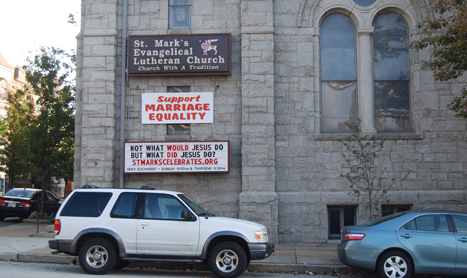BALTIMORE – St. Mark’s Evangelical Lutheran Church doesn’t look much different than any other old, stone church in Baltimore from the front. But walk around to the side of the building and you’ll find a large, white sign with bold red letters that reads, “Support MARRIAGE EQUALITY.”
St. Mark’s is a Reconciling Works congregation. Reconciling Works, formerly known as Reconciling in Christ, is a Lutheran ministry that openly welcomes and accepts members of the lesbian, gay, bisexual and transgender community into participating congregations. As a result, St. Mark’s has made a point to show its support for Maryland’s Question 6.
Question 6 is the Maryland ballot referendum that, if passed, would legalize same-sex marriage in the state.
Rev. Dale Dusman recalls the day in 1985 that the church council voted to become a Reconciling Works congregation with particular fondness.

“They voted on two things that day. They voted on my call as a pastor, and to becoming a Reconciling in Christ congregation,” Dusman said. “We were the first congregation in the Maryland (Lutheran) Senate to adopt this welcoming statement, and we remained that way for probably close to 10 years.”
Jim Harp, the organist at St. Mark’s emphasized the importance of the church’s welcoming attitude in the ’80s when members of the LGBT community were not as accepted.
“It was really a beacon, particularly in the years when this was the only place for lesbian and gay people to find a safe, Christian home environment,” Harp said.
Harp has been the organist at St. Mark’s for 25 years and, because he is gay, originally came to the church because of its open acceptance of the LGBT community.
“It’s life. It’s our spiritual home. It is acceptance. If you truly believe that Christ, that God, is love … God’s love includes everybody, including lesbians and gays,” Harp said.
Harp said he hopes that, because many people know at least one LGBT person, they will think of those people in the ballot box and feel more inclined to vote yes in order to grant them equality.
“I want them to see the face of somebody that they know,” Harp said. “If they vote yes, that’s giving them legitimacy and validity and first-class citizenship. If they vote no, they are telling that person that they’re not equal with them.”
Carole Connors is a straight woman who has attended St. Mark’s for more than 13 years. She is a member of the League of Women Voters, an organization dedicated to improving government and engaging voters.
Connors said her support of marriage equality stems from when the league announced its statewide support in 2007.
Since then, Connors has been active in trying to garner support for the cause. During the current election season, she has spent many hours canvassing and phone banking for Question 6.
Connors said marriage equality is an important religious issue, as well as an important civil issue.
“It’s for the people I love. It’s terrible to leave any segment of the population on the outside. I believe that if we give deep thought to scripture, that Jesus would lead the march,” Connors said.
Connors also argued that marriage equality extends further than the simple title that comes along with marriage.
“There are legal things that are important, such as the care of children that are caught up in these relationships. That’s the legal matter where children’s rights and protection (in homosexual relationships) need to be equal to those children in heterosexual marriages,” Connors said.
She is fervently hoping Question 6 will pass, and said she would be overwhelmed with joyful emotion if it does.
“I would cry. I would cry. I’m even crying now at the thought of it,” Connors said. “It is an issue of acceptance, of affirmation.”
Dusman, the reverend, said it is important for the church to break down the barriers of exclusion it has erected against marriage equality and other issues.
“We are called, whether we are gay or straight, to be a responsible people and I don’t think that has anything to do with our sexual orientations,” Dusman said. “If we believe in this God of incredible love, then our actions should reflect that … To put restrictions on that just doesn’t make sense to me.”
However, Dusman said he thinks it was wrong to send the issue to the ballot.
“I think it was a mistake to do that personally. I think it should’ve just been enacted as law,” Dusman said. “It’s a civil issue. If we had put the civil rights amendment up for vote, it probably would’ve failed, because we live in a very racist society … I think it was a mistake, but I realize it was the only way to get the law passed.”


You must be logged in to post a comment.